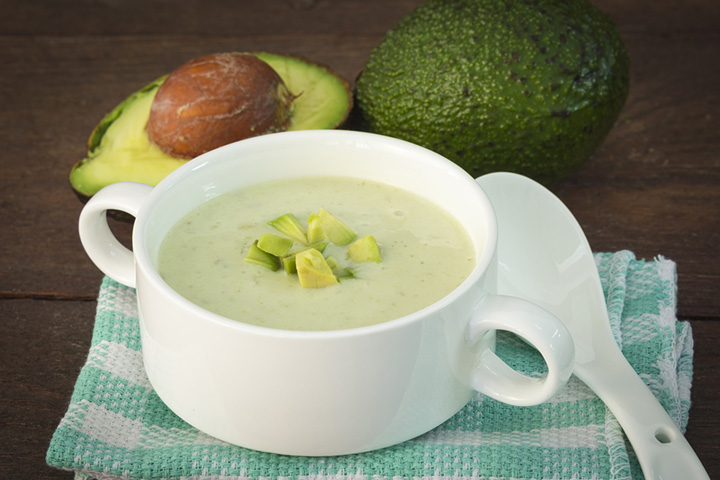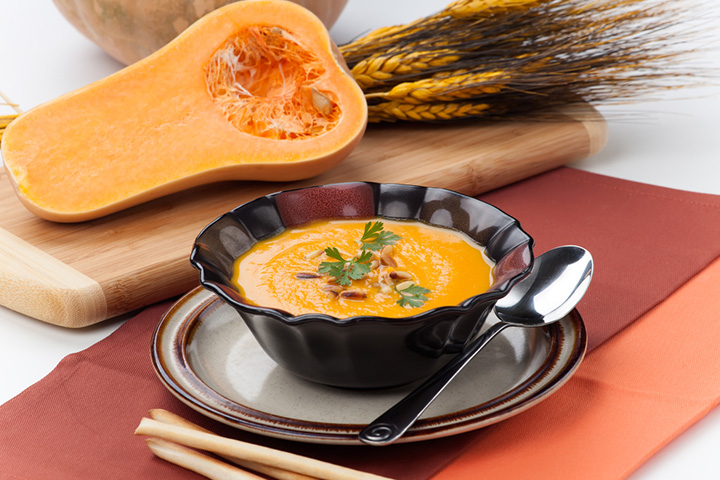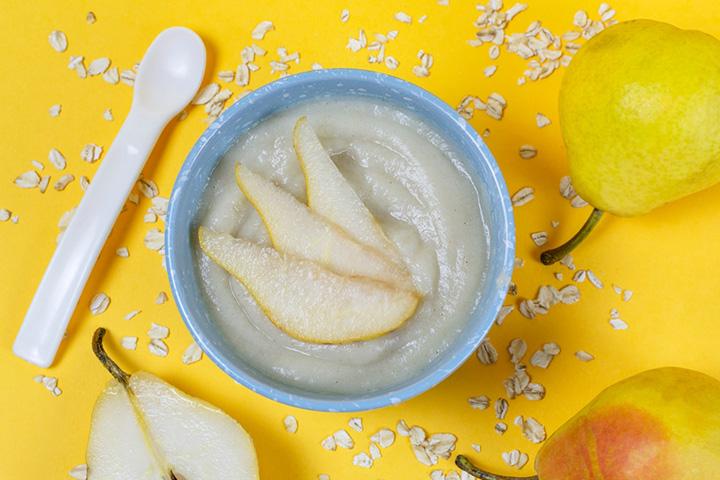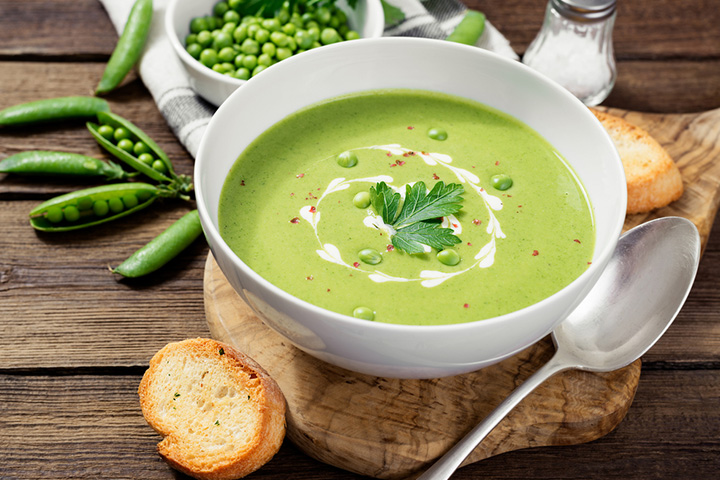
Image: ShutterStock
Finding suitable food ideas for your four months old baby may be confusing as this is probably the first time they are being introduced to solid food.
As babies turn four months, they become more active and playful. In addition, they start to exhibit more interest in their surroundings. Their stomachs also grow bigger and are ready for more food. Moreover, they seem less interested in milk and are ready to explore new food varieties.
If you recognize these signs in your baby, it is an indication that they have reached the developmental milestone where you may introduce them to solid foods.
Read the post to find whether your baby is ready for solids and to discover some interesting food ideas for them.
Is Your Baby Ready For Solids?
Your baby must have lost the ‘tongue thrust reflex’ by the time they are four months of age. Thrust reflex prevents the infants from choking. It also causes them to push the food out of their mouths. The World Health Organization recommends that we start solids at six months but solids may be introduced at four months.
According to the National Survey of Children’s Health (NSCH) survey data, the average age for introducing complementary foods to children in the United States is 4.7 months. Around 31.9% of infants start complementary feeding before 4 months, and about 51.0% begin eating solids between 4 and 6 months. The remaining 17.1% start weaning at 7 months of age or later.
If your baby seems unsatisfied after milk feeds, can hold their head up without any support, can sit without support, wakes up more frequently at night to feed, follows your food with their eyes when you eat, then probably it is the time to introduce him to solid foods. See if your baby is interested in the food or not. If your child stares and grabs your food at dinnertime, then he is ready for some variety. The baby should be able to sit well without any support. Your child needs good neck control to eat solid foods. It will enable him to swallow his food efficiently. The 4 months baby food should consist of solids.
According to Marissa Beck, MS, registered dietitian nutritionist and the founder of REVV Health, “Optimal timing is about signs of readiness over chronological age. The signs to look for are that your baby can sit with minimal support (not slouching) so that safe chewing and swallowing can occur.”
 Quick fact
Quick factTop 10 Ideas
Here are the top 10 ideas for a 4-month-old baby as they begin their journey into solid foods.
1. Baby Cereal:
Baby cereal is the most recommended first food for infants. Prepare the cereal with formula or breast milk. It will give the cereal a texture and taste that he is already familiar with. Cereal is also one of the least allergenic foods, making it suitable for babies of 4 months. Give gluten-free cereal, particularly if you have a family history of Celiac diseases or allergies. Wheat, barley, and rye cereal may be unsuitable for babies as they contain gluten. Rice and oatmeal are the least allergenic varieties of cereal.
2. Avocado:
Image: Shutterstock
If you want to serve a complete and delicious meal for your baby, then you can serve him avocado. Slice an avocado and spoon out the flesh. Mash it with a fork or puree in a food processor. Add breast milk or formula milk to make it more ‘soupy’.
3. Banana:
Bananas are considered one of nature’s most perfect foods. Babies love them for their natural sweetness. Also, banana is rich in fiber, so it will keep the things moving through your tot’s digestive system. Remove the skin of the banana and puree the flesh. You can also thin it with a little formula milk or breast milk. The food for 4 months baby is tasty with this all round nutritious fruit.
4. Butternut Squash:
Image: Shutterstock
Butternut squash has a pleasing texture, making it ideal for a baby’s palate. Baked butternut squash will make a great food for your little one. All you need to do is pierce the butternut squash and bake for an hour at 375 degrees. Cut it lengthwise and then scoop out the fibers and seeds. Then spoon out the flesh and mash with a fork or masher.
5. Sweet Potato:
Sweet potato is a popular first food for babies. It is easier to digest and does not cause constipation in children. Cut the sweet potato and simmer in a little water until tender. Transfer to a food processor and puree, adding a little water or breast milk.
6. Carrots:
Image: Shutterstock
Carrot is another great choice for baby food. Cut the carrots into sticks and bake for over 20 to 30 minutes at 375 degrees Fahrenheit. The food for 4 month old baby is healthy with carrots.
7. Apple:
With your doctor’s consent, you can serve cooked apples to your baby. Dice the apple and simmer or steam until tender. Cooking apple until it is just tender will ensure that all the nutrients are preserved. Transfer to a blender or food processor and blend until smooth. The 4 month old baby food is extremely nutritious with this addition.
8. Pear:
Image: Shutterstock
Pears are one of the safest foods to give as a first food. The allergic reactions to pear are rare. Also, they have a low acidity level, which makes them gentle on the tiny tummies. Puree steamed pear and add to the baby’s cereal.
9. Milk:
At this stage, breast milk will provide total nutrition to your baby. Don’t even think of replacing breast milk or formula until 12 months of age. It can cause serious health implications. Also, never give your child low-fat or skim milk products until he is 2 years old. The 4 months old baby food is extremely delicious with milk.
 Quick fact
Quick fact10. Peas:
Image: Shutterstock
Fiber filled peas will make an ideal first veggie for babies. Steam the peas for 6 minutes and puree in a food processor, adding the cooking liquid. Strain using a sieve to discard the solids. Pea puree may thicken after it is refrigerated. So stir in a small amount of water, formula or breast milk while heating.
Tips
- A baby’s tummy is the size of his fist. Do not expect your baby to finish a meal. He probably will eat just ½ of a tablespoon portion of what you serve to him.
- Serve a food to baby for four days at a stretch. It will help you learn the signs of intolerance and allergy. Follow this process until your baby has tried a variety of foods.
- Always serve cooked veggies to your baby so that he can chew it easily. Cooking breaks down the cell wall, making the food easier to digest by the baby.
- Place the spoon near your baby’s lips and let him taste and smell. Don’t be surprised if your tot rejects the first spoon. Wait for a few minutes and try again.
- Do not add any salt or pepper to the baby food.
- As your baby gets used to solid food, make the puree less runny. You can mash the food instead of pureeing it.
 Point to consider
Point to considerFrequently Asked Questions
1. What if a baby refuses their first solid food?
A baby might refuse solid food if they are full, unwell, or irritable. Hence, try feeding them when they are hungry. Check the consistency of the solid food and make it baby-compatible. Foods that are too hot or too cold might also be refused. Try a variety of foods initially to see the taste they prefer the most. If your baby still refuses to eat solid foods, consult a pediatrician.
2. Can I give my four-month-old orange juice?
Juices may seem easy to introduce babies to the taste of fruits. However, the American Academy of Pediatrics advises not to give babies juices until one year unless recommended by a pediatrician (1).
3. How do I keep baby foods safe?
Always feed your baby fresh, home-cooked food. Wash the ingredients properly in clean tap water. If you are preparing baby food in bulk, freeze the food immediately in a tightly sealed container. Label the container with the date of preparation and time. Only take out the required amount of food from the container when feeding a baby (2). Always check the quality of the food before feeding it to a baby.
4. Do doctors recommend solids at four months?
Blanca Garcia, RDN, nutrition specialist at MIDSS, suggests, “The Academy of Pediatrics (AAP) supports parents who want to breastfeed exclusively for about six months after birth. Therefore, not all doctors may recommend that infants start solids at four months. Some evaluate an infant and may determine that they may be ready at four months, but it’s not blanket advice for everyone.”
If you are looking for food ideas for your 4-month-old baby, begin by offering easily digestible foods such as bananas, sweet potatoes, and cereals. At four months, your tiny tot may be interested in eating foods other than milk. Though most babies are fed various solid foods after six months, you may introduce mashed forms of foods after they cross the four-month mark. Nevertheless, do not rush into introducing foods to your baby. Also, remember that all babies do not react to new foods alike. Hence, if you notice that your baby is not interested in certain foods, give them some time or try feeding other varieties.
Infographic: Delicious And Nutritious Solid Foods For 4-Month-Olds
Babies can begin ingesting solids between four and six months of age. However, they cannot be fed hard solids, and require purees made from fruits and baked vegetables. This infographic provides a few healthy purees to feed your four-month-olds. Save and share it with other new mothers too! Illustration: Momjunction Design Team
Get high-quality PDF version by clicking below.
Download Infographic
Key Pointers
- 4-month-old babies can consume the puree of avocado, banana, and carrots.
- To identify food intolerance issues while introducing solids, serve one food for three to four days instead of feeding mixed foods.
- Avoid adding spices or salt to baby food.
References:
- Weighing in on fruit juice: AAP now says no juice before 1.
https://publications.aap.org/aapnews/news/14804 - How to make homemade baby food?
https://www.eatright.org/food/planning-and-prep/snack-and-meal-ideas/how-to-make-homemade-baby-food# - Starting Solids
https://www.llli.org/breastfeeding-info/starting-solids/ - Cow’s milk and children
https://medlineplus.gov/ency/article/001973.htm - Salt: the facts
https://www.nhs.uk/live-well/eat-well/food-types/salt-nutrition/#:~:text=Babies%20should%20not%20eat%20much,including%20sodium%2C%20from%20breast%20milk






















